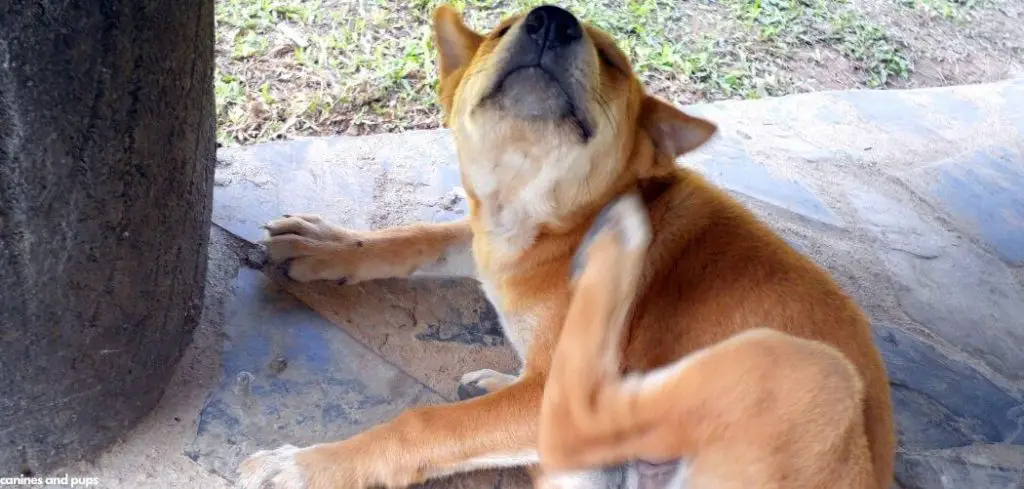If your dog starts excessively scratching after grooming, it can be stressful and confusing. Grooming should leave your dog feeling clean and refreshed, not uncomfortable or itchy.
We outline the common causes of excessive scratching after grooming in dogs, what you can do, and when to seek veterinary help.
Table of Contents
Dog Excessive Scratching After Grooming — Why It Happens
Excessive scratching after grooming in dogs often happens due to skin irritation, dryness, product sensitivity, or underlying conditions triggered by the grooming process. Dogs may react to shampoo ingredients, clippers, or brushes, and in some cases, existing allergies or parasites become more noticeable afterward. Grooming can also strip natural oils, leaving the skin dry and itchy.

Excessive Scratching After Grooming in Dogs: Common Causes
Shampoo or Conditioner Sensitivity
Some dogs have sensitive skin that reacts strongly to certain shampoos or conditioners. Ingredients such as artificial fragrances, dyes, or harsh chemicals can cause irritation. After grooming, you may notice your dog scratching, biting, or licking at their skin.
Dogs with pre-existing allergies are especially prone to reacting to grooming products. Red patches, hives, or flaking skin may appear within hours of the bath.
Read more: Dog Excessive Scratching No Fleas (Why it happens)
Dry Skin From Over-Bathing
Bathing can sometimes strip away the natural oils in a dog’s coat. These oils keep the skin moisturized and healthy. When removed, dryness and itchiness may set in.
Excessive grooming or washing too frequently makes this problem worse. Dry skin often appears as dandruff-like flakes and causes persistent scratching.
Razor Burn or Clip Irritation
Dogs with close haircuts or clipper shaves may experience razor burn. The clippers can create tiny abrasions on the skin or irritate sensitive areas like the belly, armpits, or inner thighs.
This irritation can lead to redness, inflammation, and excessive scratching as the skin heals. Short-coated breeds and dogs with sensitive skin are especially vulnerable.
Allergic Reaction to Grooming Sprays or Perfumes
Some groomers use finishing sprays, perfumes, or deodorizing products after grooming. While these make dogs smell pleasant, they can cause allergic reactions in sensitive pets.
A dog reacting to these products may scratch, rub against furniture, or develop red and itchy skin, particularly around the face, ears, and neck.
Parasites Revealed During Grooming
In some cases, grooming doesn’t cause the problem but makes it more visible. Fleas, mites, or ticks may go unnoticed until after a grooming session when the hair is shorter, and skin is exposed.
Even if your groomer checks for parasites, it’s possible to miss an infestation, especially if it’s just beginning. Dogs will continue scratching, making owners believe grooming triggered it.
Stress or Anxiety Response
Not all scratching is due to skin problems. Some dogs develop excessive grooming and scratching behaviors as a stress response. The grooming environment, unfamiliar smells, loud clippers, or handling may trigger anxiety.
Once home, the dog may keep scratching as a way to self-soothe, even if the skin itself is not irritated.
Read more: Dog Excessive Scratching and Hair Loss (Why it happens)
What to Do If Your Dog Is Excessively Scratching After Grooming
If your dog won’t stop scratching after grooming, start by checking their skin. Look for redness, bumps, scabs, or flakes that suggest irritation.
Rinsing your dog with plain, lukewarm water may help wash away leftover product residue.
Applying a vet-approved soothing spray, hypoallergenic moisturizer, or oatmeal-based rinse can help calm the skin. If you suspect the shampoo was the problem, switch to a gentle, fragrance-free, and hypoallergenic brand.
Keep your dog from scratching too much, as it can break the skin and increase the risk of infection. Using an Elizabethan collar (cone) temporarily may help prevent self-injury.
If your dog seems anxious, offering a quiet environment, favorite toys, or calming treats may reduce stress-related scratching.
When to Call or Visit Your Vet
While mild scratching after grooming is fairly common and often temporary, some signs mean you should seek veterinary advice.
If your dog develops intense redness, swelling, or hot spots, these could indicate an allergic reaction or infection. Severe or nonstop scratching that prevents rest is also concerning.
Persistent dandruff, hair loss, or sores suggest a deeper skin condition that requires medical treatment. If parasites are found, your vet can recommend appropriate preventatives or treatments.
Any signs of respiratory distress, widespread hives, or facial swelling after grooming may indicate a severe allergic reaction and require immediate veterinary care.
Read more: Dog Excessively Scratching (Why it happens and what to do)
Key Takeaway
Excessive scratching after grooming is usually related to skin irritation, product sensitivity, or stress, but it can also reveal underlying problems like parasites or allergies. While mild scratching may resolve on its own, persistent or severe itching needs veterinary attention.
The best approach is to monitor your dog closely, try gentle remedies at home, and involve your vet if the problem continues.
With the right care and grooming adjustments, your dog can feel clean, comfortable, and happy after every session.
